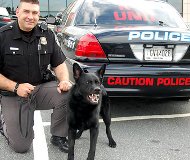2/20/2013
US Supreme Court Expands Use of Drug Dogs During Traffic StopsUnanimous US Supreme Court strikes down Florida requirement of proof of drug dog efficiency for traffic stop searches.

America's highest court on Tuesday made it easier for police to use drug dogs to perform warrantless searches during traffic stops. The US Supreme Court upheld the search of a truck based solely on a dog's alert during a stop for a minor traffic infraction.
On June 24, 2006, County, Florida Sheriff's Deputy William Wheetley was on patrol with his trained German shepherd, Aldo. Wheetley stopped Clayton Harris for an expired tag and noticed an open can of beer in the truck's cup holder. Harris refused to consent to a search of the truck, so Wheetley had Aldo perform a "free air sniff" and the dog alerted at the driver's side door handle. This gave Wheetley probable cause to search the truck without a warrant.
Harris was not actually carrying any drugs that Aldo was trained to detect. Instead, he had several ingredients for methamphetamine: pseudoephedrine pills, matches, hydrochloric acid, antifreeze and iodine crystals. Two months later, Harris was stopped by the same officer and Aldo once again alerted on the truck's door handle, but no drugs or ingredients were found in the truck.
At trial, Harris argued the sniffs were bogus because the dog twice alerted on a truck containing no drugs. He pointed out Aldo was certified as a trained drug dog, but the certification had expired -- Florida law does not set any standards for such certification. In the field, Wheetley only kept records of when Aldo successfully sniffed out drugs resulting in an arrest.
Prosecutors countered it was "residual odor" that triggered the alert. Florida's Supreme Court agreed with Harris that the state needed to produce a history of the drug dog's field performance for there to be reliable enough evidence to conduct a search without a warrant. All nine of the federal justices blasted this line of reasoning.
"One wonders how the court would apply its test to a rookie dog," Justice Elena Kagan wrote for the court. "If a dog on patrol fails to alert to a car containing drugs, the mistake usually will go undetected because the officer will not initiate a search.... the designers of an assessment know where drugs are hidden and where they are not -- and so where a dog should alert and where he should not. The better measure of a dog's reliability thus comes away from the field, in controlled testing environments. For that reason, evidence of a dog's satisfactory performance in a certification or training program can itself provide sufficient reason to trust his alert."
The justices did allow defendants the ability to challenge a particular dog's performance or training under the usual rules of criminal procedure. Civil rights advocates, including the conservative Rutherford Institute, believe the decision will erode constitutional protections for everyone.
"This ruling undercuts the entire basis of the Fourth Amendment, which was designed to protect us from unreasonable searches and seizures," Rutherford President John W. Whitehead said in a statement. "When dog sniffs, which have proven to be unreliable, are considered probable cause for police to search your property without a warrant -- whether it's your home, your car or your person -- then none of our rights are secure."
A copy of the decision is available in a 110k PDF file at the source link below.


